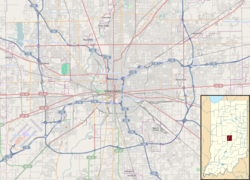Calvin I. Fletcher House | |
 Calvin I. Fletcher Home, January 2010 | |
| Location | 1031 N. Pennsylvania St., Indianapolis, Indiana |
|---|---|
| Coordinates | 39°46′55″N86°9′19″W / 39.78194°N 86.15528°W |
| Area | less than one acre |
| Built | 1895 |
| Architectural style | Queen Anne |
| NRHP reference No. | 84001089 [1] |
| Added to NRHP | March 1, 1984 |
Calvin I. Fletcher House is a historic home located at Indianapolis, Indiana. It was built in 1895, and is a 2+1⁄2-story, Queen Anne style brick dwelling on a limestone foundation. It has an elaborate hipped roof with gabled dormers. It features an eight-sided corner tower with pointed arched windows on each side. Also on the property is a contributing carriage house. [2] : 2
It was listed on the National Register of Historic Places in 1984. [1]


